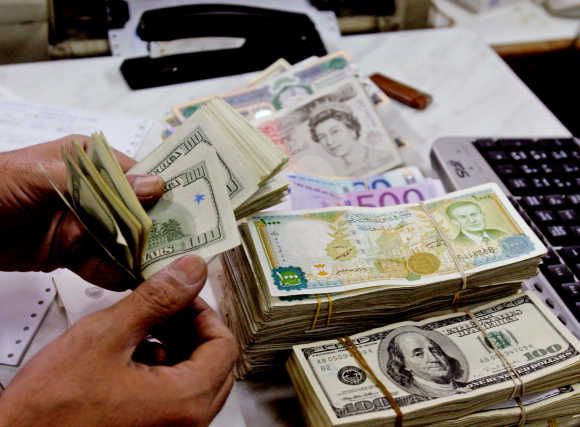
The government will initiate action in a big way in those cases where it gets definite information
A government crackdown on black money has led to detection of undisclosed income of over Rs 16,000 crore (Rs 160 billion) since March 2014, while assets worth Rs 1,200 crore (Rs 12 billion) have been seized, Revenue Secretary Hasmukh Adhia said on Wednesday.
"In 2014-15 and 2015-16 (up to November), the Income Tax Department by its enforcement actions has detected undisclosed income worth more than Rs 16,000 crore and seized assets worth Rs 1,200 crore (Rs 12 billion)," he said.
"Prosecution has been filed in 774 cases (up to September 2015)."
The measures included a one-time 90-day window to come clean on undisclosed wealth, which led to declarations worth over Rs 4,160 crore (Rs 41.6 billion), and the government is expecting Rs 2,500 crore (Rs 25 billion) as tax and penalties by month-end, he told PTI.
"The present government is very serious on the issue of black money.
“Various pronouncements of Prime Minister Narendra Modi and Finance Minister Arun Jaitley have made it very clear that this government does not want to spare any effort to bring people with black money to book," Adhia said.
To deal with illegal wealth stashed abroad, the government legislated the Black Money (Undisclosed Foreign Income and Assets) and Imposition of Tax Act, 2015 which provides for stringent penalty and jail term.
A one-time compliance window was provided to illegal foreign wealth holders to pay a tax and penalty of 60 per cent and escape the new law's penal provisions.
In all, 635 declarations worth Rs 4,160 crore (Rs 41.6 billion) of illegal wealth were made in the three-month compliance window.
"The last date for paying Income Tax for those people who made disclosures under the Black Money Act is December 31, 2015.
"We are hopeful of getting approximately Rs 2,500 crore (Rs 25 billion) as tax in the current year," he said.
Articulating steps taken by the government to curb black money, he said the requirement of mandatory furnishing of PAN for money transactions above certain limits is a way of making people report their income legitimately.
In addition, the government will initiate enforcement action in a big way in those cases where it gets definite information.
"Our attempt to get more information from governments of other countries about the resident tax payers is likely to get more traction in 2016," he said.
Also, international cooperation on tax matters is gaining momentum now, with a multilateral agreement on automatic exchange of information taking final shape.
Under the Foreign Account Tax Compliance Act, signed with the US, India has already started getting information.
The image is used for representational purpose only. Photograph: Reuters










 © 2025
© 2025